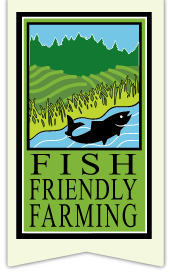Get Involved
Fish Friendly Farming certifies the following crops: winegrapes, tablegrapes, pears, apples, cherries, nectarines, peaches, olives, walnuts, blueberries, and grazing land. We are currently developing the program for irrigated pasture, corn, alfalfa, almonds, prunes, rice, sugarbeet, tomatoes, walnuts, wheat and other small grains.
1) Enrollment: Owners or managers of vineyards and orchards voluntarily enroll their property in the Fish Friendly Farming program
2) Attendance Workshops: Farmers attend educational workshops. The workshops cover all aspects of land management, including:
- existing vineyard/orchard or field management
- new vineyard/orchard design
- water and soil conservation
- creek and river riparian corridor management and restoration
- revisions to water facilities to assure in-stream flow for fish
- road repair and maintenance
As they go through the workshops, each farmer will work with the FFF program staff to complete a Farm Conservation Plan for their property.
3) Farm Conservation Plan: The Farm Conservation Plan inventories and evaluates natural resources and practices on the entire property, not just the agricultural lands. This approach assures a comprehensive program to achieve environmental quality and improvement. Following the workshops, the FFF program provides professional one-on-one technical assistance for each landowner/manager to complete the Farm Conservation Plan. This allows for all sediment sources and stream and river riparian corridors and water sources to be evaluated by a scientist. Various projects such as creek restoration and revegetation, water supply facility retrofit, road repair, and erosion site repair are identified in the Plan as well as the documentation of environmentally friendly management practices such as the use of cover crops or no-till practices. As a result, each Farm Conservation Plan is completely unique to each site.
4) Certification: When the Farm Conservation Plan is completed the site is certified through a third party review of the property and the Plan. The certification team is made up of one or more of the following agecies; the National Marine Fisheries Service, North Coast Regional Water Quality Control Board, Natural Resource Conservation Service, and the County Agricultural Commissioner.
5) Implementation: The farmer takes steps to implement the actions and projects identified in the Farm Conservation Plan. Simple changes in management practices are given a shorter time frame for implementation, while larger projects such as creek restoration or road repair have longer time frames. CLSI continues to work with the owner to cost-share implementation of major projects. In addition, the farmer annually documents actions through photo-monitoring and an online audit.
6) Re-Certification: After 5 years, a certified site goes through the process of re-certification, to ensure that the required actions in the farmplan are being implemented and to update the Farm Conservation Plan if needed.

